The forgotten gay soldiers of the First World War
Wednesday 11 November marks 102 years since Armistice Day and the end of The Great War.
By Will Stroude
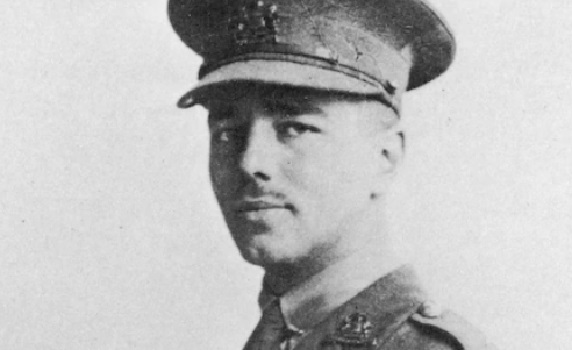
Words: Hugh Kaye
Wednesday marks the 102nd anniversary of the end of World War I – the day the guns fell silent, the end of the war that was supposed to end all wars.
A total of about 70 million people were mobilised on all sides during a conflict which lasted 52 months. As many as 19 million are thought to have died, with a further 21 million injured.
By the law of averages – even if only two per cent of people are homosexual, and not the one in 10 that some people think – that means an awful lot of gay men fought and died. You do the maths.
They fought far from home, in places many of them could never have expected to see or had even heard of. They must have fought in the early battles such as La Cateau, Mons and on the Marne, at Cambria, at Ypres and killing fields of Verdun. They fought at the naval battle of Jutland, at Gallipoli and through the mud at Passchendaele. In the Sinai and what was then Palestine. All the while keeping their secret as their comrades talked about wives and girlfriends back home.
Some people hold the belief that the Great War sparked the modern gay rights movement. Laurie Marhoefer, an assistant professor of history at the University of Washington, said: “Gay soldiers who survived the blood-letting returned home convinced their governments owed them something – full citizenship.” In Germany, he added, organisations including the German League for Human Rights, which had about 100,000 members, called for some sort of gay equality.
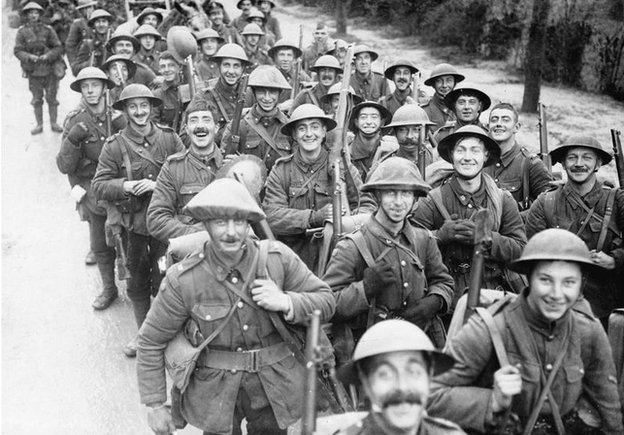
The truth of the matter is most of those who survived faced the same old hatreds. In the UK, they remained outlaws for another 50 years while those high hopes in Germany were dashed by the rise of the Nazis.
Although it was not actually prohibited by British army regulations – that didn’t happen until 1955 – homosexuality was illegal throughout the UK so most gay soldiers kept their sexuality hidden, possibly adding to the misery they were already experiencing in the trenches of the Western Front: living, eating and sleeping in mud, plagued by rats and constantly under enemy fire and the threat of poisoned gas.
In addition, as the casualties mounted, there was a growing emphasis on men “doing their duty” by having more children to counter the falling male population. Being gay, therefore, was not only illegal but also seen as unpatriotic.
That said, homosexuality activity was “not exactly unknown” in the British army, according to historian A.D. Harvey.
War poets Wilfred Owen – who died a week before the armistice was signed and is famous for works such as ‘Anthem for Doomed Youth’ and ‘Dulce et Decorum Est’ – and Siegfried Sassoon, who survived the war and whose poems include ‘Suicide in the Trenches’ and ‘Aftermath’, were both gay, although it was not public knowledge at the time.
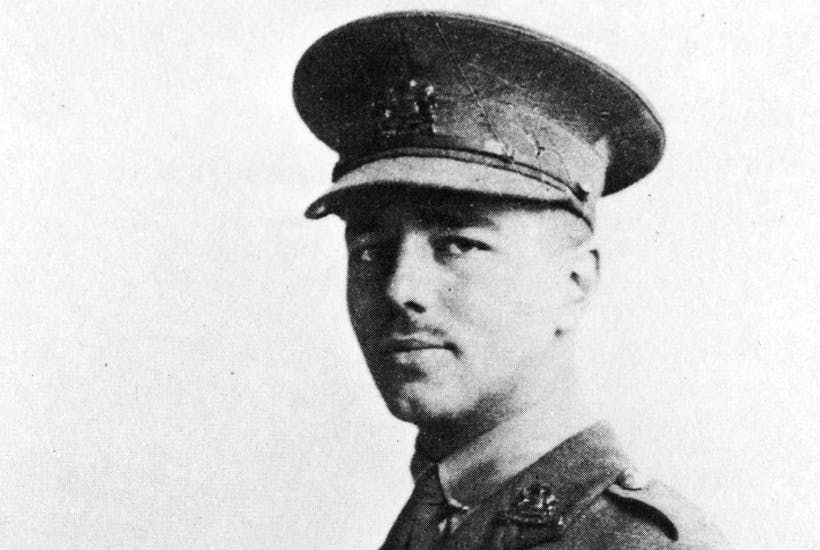
Wilfred Owen was killed in action on 4 November 1918, exactly one week before the signing of the Armistice
Shortly before his death, Owen sent a letter to a cousin, describing meeting two French girls who were attracted to him, causing jealousy among other officers. “The dramatic irony was too killing, considering certain other things, not possible to tell in a letter,” the poet wrote cryptically. He was killed in action on 4 November 1918 and is buried in Northern France. His mother received the telegram notifying her of his death a week later as church bells rang to mark the signing of the armistice.
Another war poet, Rupert Brooke, once called the most handsome young man in England, is said to have described himself as one half outright heterosexual, one quarter outright homosexual and one quarter “sentimental homosexual.”Brooke, best known for The Soldier (“If I should die, think only this of me: That there’s some corner of a foreign field That is for ever England”) died of blood poisoning on a hospital ship, moored as part of the force attacking Gallipoli in 1915. He is buried in his corner of a foreign field: Skyros, in Greece.
Gay soldiers who were open about their sexuality were often ostracised and reported to their superior officers for “indecency”. At least 230 fighting men were court-martialled and sent to prison.
Others were tried and convicted in civilian courts. Lieutenant Wilfrid Marsden, of the Royal Flying Corps – which was soon to become the RAF – appeared at the Old Bailey in London in January 1916 and was sentenced to two years hard labour. A letter from a fellow officer, F.R. West, was found in his possession, detailing a liaison with another man. “He was perfectly charming and very affectionate. His legs, my dear, were too wonderful,” he wrote.
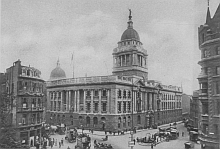
The Old Bailey, London
West was dragged from the trenches in France, court-martialled and thrown out of the armed services.
At least two other gay men had been sentenced to hard labour in the spring of 1915. Frederic Llewellyn had fought in the Boer War at the beginning of the 20th Century before leaving the army then signing up again when war was declared in 1914. At the time of his arrest he was second in command of the 8th Battalion, the Oxford and Buckingham Light Infantry. He was tried and convicted on six counts of indecency. Meanwhile, Alfred Boyd, a lieutenant in the Territorials, was found guilty on nine charges.
To make matters worse, many gay servicemen were tormented by what they thought was a sickness or a vice and saw the war as a way to rid themselves of it.
Stephen Bourne, the author of Fighting Proud, tells of Edward Brittain, a soldier from Macclesfield, who earned the Military Cross for his gallantry during the terrible Battle of the Somme in 1916 – the first day of which remains the darkest day in British military history with almost 20,000 men being slaughtered and close to twice that number being wounded. All to gain just a few miles.
Brittain was killed in 1918 in the Battle of the Piave River, but after the war his sister Vera revealed that the day before he died her brother had been accused of homosexual activity, following the opening of a letter of his by the censor. Historians now believe he walked into the enemy gunfire as a form of suicide.
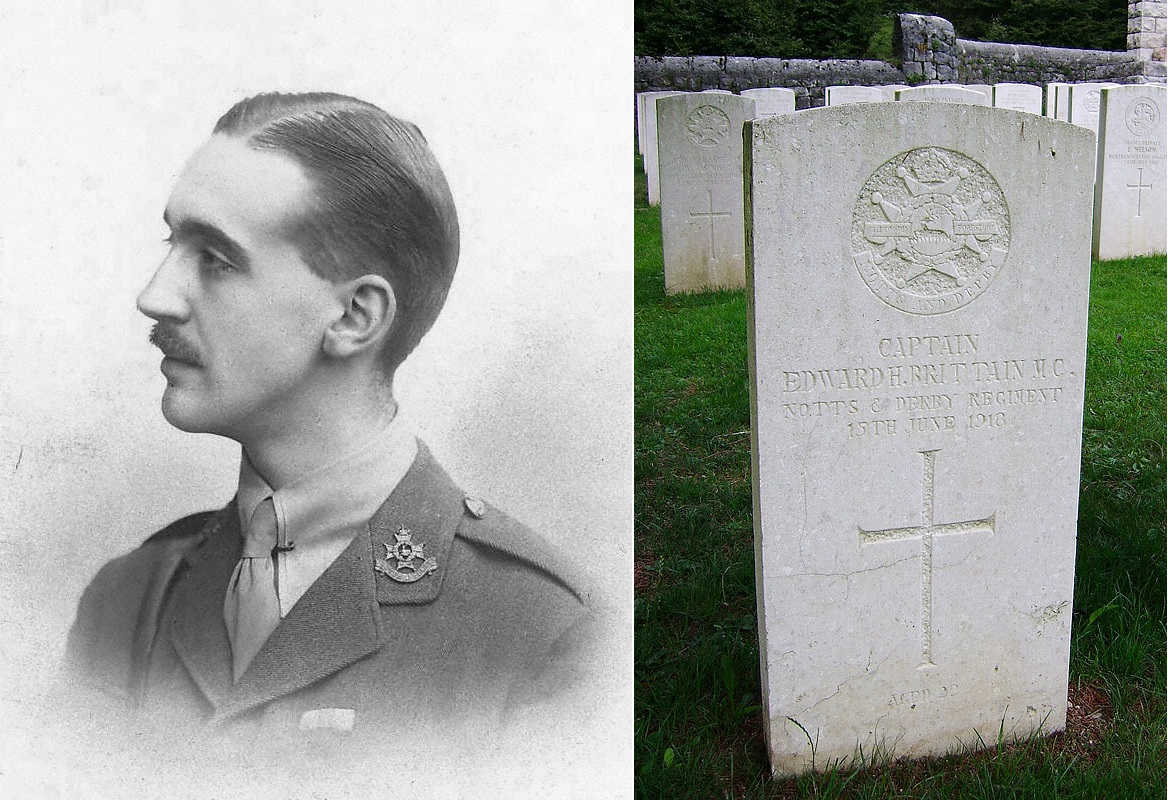
Captain Edward Brittain is buried in Granezza British Cemetery on the Asiago Plateau in Italy
But gay men weren’t only serving in the British army. In Russia, an historian uncovered a letter sent by a petty officer to a psychiatrist in which he describes his attraction to other men he served with, his exhaustion from living a “strange life” and his desire to die on the battlefield, fighting against Germany.
The letter goes on to say: “At 15, I was working as a shop assistant and the owner [showed] me a collection of pornographic cards. After some time, I started experiencing attraction toward men, trying to seduce them, not understanding this terrible vice. Of course, I did this with great caution.
“Then I was drafted for military service, where I found a convenient setting for my fulfilment. I’ve never felt any attraction toward women and frequently entertained thoughts of suicide. Then war was declared and I was mobilised. My experiences at the front made me forget my rotten past but when I became a hero and was awarded the St George’s medal, I was ashamed, remembering my base and vile private life.
“Then I was wounded in a German trench. After two operations, I begged for death but life came back to me; my body didn’t quit.”
A story with a happier ending concerns architect and photographer Montague Glover, another recipient of the Military Cross. Born into the middle classes he was known to have had affairs with rent boys and young men from the supposedly lower classes – labourers, road-builders, dockers – in itself somewhat shocking for the time. But he met Ralph Hall in the 1930s and they went on live together for 50 years until Monty’s death in 1983.

Montague Glover (left) was awarded the Military Cross for Bravery in 1918. He met partner Ralph Hall (right) in 1930 and remained with him until his death in 1983.
When Ralph died four years later, Monty’s “gay family album” was discovered. It was packed with love letters, photos of their time together and snaps of other men dressed in army uniforms or just boxer shorts.
And while serving in Egypt celebrated author-to-be E.M. Forster had a three-year relationship with a young local, Mohammed el Adl. It ended in 1918 when Mohammed was forced to marry, but he never forgot his friend and named his son after his former lover.

As a conscientious objector in the First World War, Marice author E.M. Forster served as a Chief Searcher for missing servicemen for the British Red Cross in Alexandria, Egypt.
After his death in 1922, Mohammed’s widow sent Forster her husband’s gold ring as a keepsake. Legend has it that the author of the gay romance Maurice slept with it under his pillow every night.
Another gay man fighting at the Somme was future playwright and journalist Joseph Randall Ackerley. He lay wounded for six hours before being rescued but was injured again the following year. This time he was picked up by German stretcher-bearers and ended up in captivity.
In 1925, he published the outspokenly pro-gay play The Prisoners of War in which he is open about his sexuality, as he was in his later books and poems. He was warned by a publisher that the day after publishing My Dog Tulip (1956), “the police will be around to arrest you.”
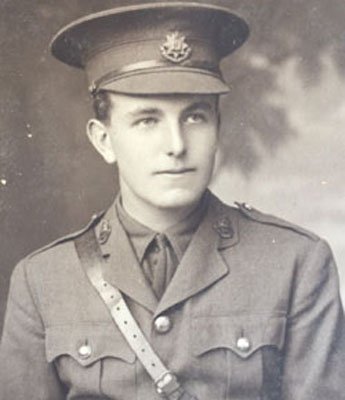
Writer Joseph Randall Ackerley began writing pro-gay play The Prisoners of War while interned at a prisoner of war camp in Switzerland in 1917
Nonetheless, he refused to hide his sexuality and became one of the first high-profile gay personalities and, in 1942, spoke out against the unfair treatment of homosexuals. “I think that life is so important and, in its workings, so upsetting, that nobody should be spared, but that it should be rammed down their throats from morning to night,” he wrote. “And may those who cannot take it die of it; it is what we want.”
On the other side of the trenches, gay men also served in the Kaiser’s army. In the winter of 1915 an unknown German soldier died in a Russia field hospital, after being hit by shrapnel. Although his identity has never been uncovered, a letter to his boyfriend – identified only as S – revealed that he “craved a mouthful of decent water, of which there isn’t any here”.
But the letter concludes: “There is nothing to read, please send newspapers. But, above all, write very soon.”
That boyfriend had had to watch the man he loved go off to war, only to die alone and in pain, while S himself sat hundreds of miles away, unable to help or comfort him. It was later discovered that S’s replies never got through to his lover, lost in the chaos of war.
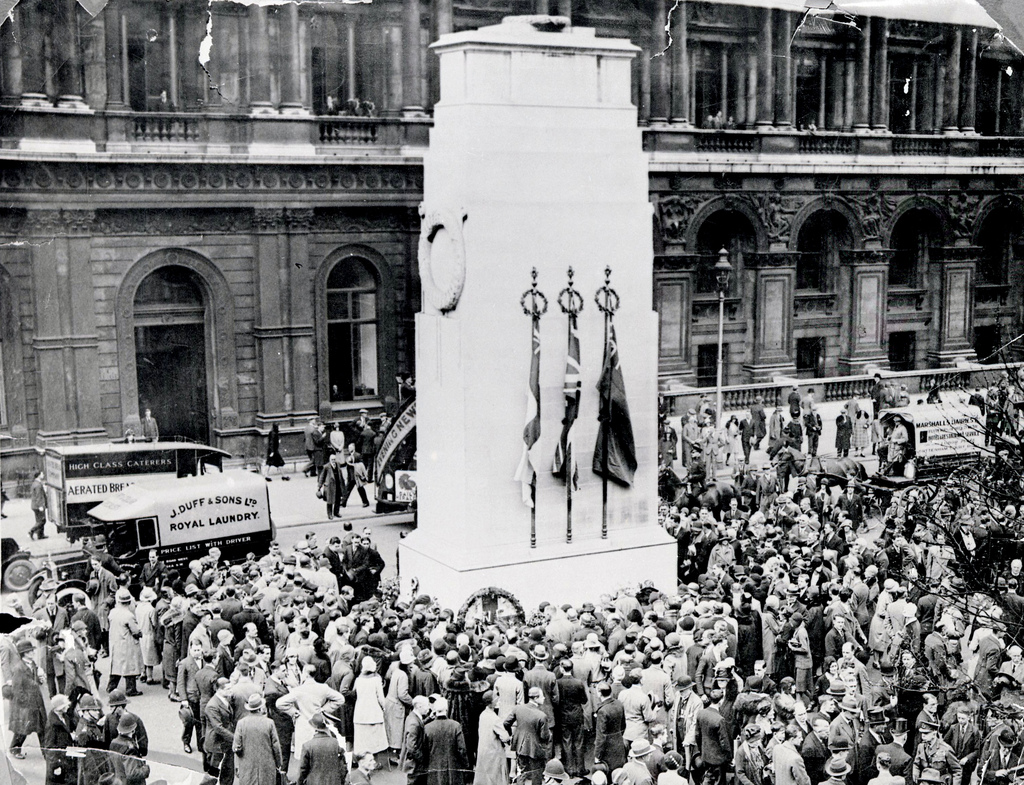
The Cenotaph war memorial in London was unveiled 97 years ago on 11 November 1920.
All in all, gay men fought gallantly and died for their countries. But officers who were found guilty of “indecency” and tried to re-enlist as “common soldiers” were referred to as the ‘Dirty Brigade’.
How they were thought of may best be summed up in John Buchan’s 1916 novel Greemantle, a sort-of follow-up to the more famous The 39 Steps, when the hero sees the quarters of a German officer: “At first sight, you would have said it was a woman’s drawing room. But it wasn’t… I soon saw the difference… the queer other side to my host, that evil side that gossip had spoken of, not unknown in the German army.”
However, it was whispered in high circles that even the Secretary of State for War, Field Marshal Lord Kitchener – the one in the famous poster with his finger pointing out and the words ‘Your Country Needs You’ – was having a love affair of his own with his military secretary Lieutenant-Colonel Oswald Fitzgerald…
